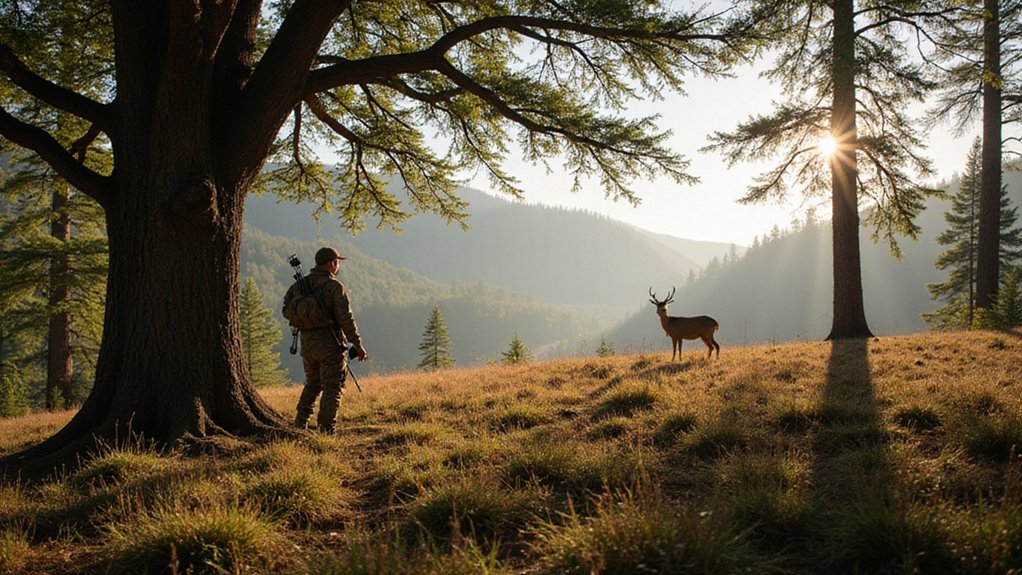When it comes to effective hunting strategies, understanding the nuances of animal behavior and the environment is vital. You need to choose the right tools and adapt your approach based on the game you’re pursuing. It’s not just about being in the right place at the right time; there’s a lot more to reflect upon. What if you could enhance your success by applying some proven techniques? Let’s explore those strategies that can make a real difference.
What Are Effective Hunting Strategies for Beginners?
What makes a hunting strategy effective for beginners?
First, it’s essential to understand your environment. Familiarize yourself with the terrain and the habits of your target game.
Choose a simple and clear plan that focuses on stealth and patience. Start early in the morning or later in the evening when animals are most active.
Don’t forget to practice your shooting skills; accuracy is key. Additionally, using reliable gear can increase your confidence.
Finally, consider hunting with experienced friends who can share tips and provide guidance.
How to Choose the Right Hunting Strategy for Your Game
How do you determine the best hunting strategy for your game?
Start by evaluating the type of game you’re pursuing. Different animals require different approaches. Research their habits, habitat, and seasonal patterns.
Consider your own skill level and available equipment; some strategies demand more experience or specialized gear.
Evaluate the terrain and weather conditions, as these factors can greatly influence your success.
Finally, be adaptable. Sometimes what works for one hunt may not be effective for another. Stay flexible, and don’t hesitate to adjust your approach based on real-time observations.
Your ability to adapt can make all the difference.
Why Understanding Animal Behavior is Key to Successful Hunting
Understanding animal behavior can greatly enhance your hunting success. By observing how animals interact with their environment, you’ll make smarter decisions in the field.
Knowing their habits allows you to anticipate movements and increase your chances of a successful hunt.
- Recognize feeding patterns to determine the best times to hunt.
- Understand mating behaviors to identify peak activity periods.
- Observe escape routes to strategize your positioning effectively.
What Tools and Equipment Enhance Your Hunting Strategies?
While you may have a solid grasp of animal behavior, the right tools and equipment can markedly elevate your hunting strategies.
A reliable rifle or bow tailored to your skill level is essential. Invest in high-quality optics, like binoculars or scopes, to enhance your target visibility. Good camouflage clothing helps you blend seamlessly into your environment.
Don’t overlook the importance of a sturdy backpack to carry essentials, including first-aid kits and snacks. Ultimately, consider using game calls and scent attractants to draw animals closer.
With the right gear, you’ll boost your confidence and effectiveness in the field. Happy hunting!
How to Adapt Your Hunting Strategies for Different Environments
Adapting your hunting strategies for different environments is essential if you want to maximize your success. Each location demands a unique approach, so consider these key factors:
- Terrain: Understand how the landscape affects animal movement; dense forests require stealth, while open fields may need longer-range tactics.
- Weather: Adjust your plans based on conditions; rainy days can push animals to shelter, while clear skies may enhance visibility.
- Season: Know the habits of your target species; migration patterns and breeding seasons can greatly influence your hunting strategy.
What are the Best Practices for Tracking Game?
Effective tracking is an essential skill that complements your hunting strategies in various environments. Start by studying animal behavior and understanding their habits; this knowledge will guide your tracking efforts.
Look for signs like footprints, droppings, and broken branches to determine the animal’s path. Move slowly and quietly, as noise can scare them away. Pay attention to the wind direction, ensuring it works in your favor.
Mark key points to avoid losing your trail. Finally, practice patience—successful tracking often requires time and persistence.
With these best practices, you’ll enhance your ability to locate and ultimately harvest your game effectively.
How to Use Technology to Improve Your Hunting Success
As technology advances, hunters can leverage various tools and gadgets to enhance their success in the field.
Using these innovations can greatly improve your hunting experience:
- GPS Devices: Keep track of your location and navigate through unfamiliar terrain effortlessly.
- Trail Cameras: Monitor wildlife activity and patterns, helping you determine the best hunting times and locations.
- Smartphone Apps: Access weather forecasts, moon phases, and hunting regulations, ensuring you’re always prepared.
Why Safety Should Be a Priority in Your Hunting Strategies
When you’re out in the field, prioritizing safety can mean the difference between a successful hunt and a dangerous situation.
Always wear appropriate gear, including blaze orange, to guarantee visibility. Be aware of your surroundings and know the location of other hunters. Before firing, positively identify your target and what’s beyond it. Carry a first aid kit and know basic emergency procedures.
If you’re hunting with others, establish clear communication signals. Avoid alcohol and drugs that impair judgment.
